MG411: Performance Management Case Study of Nissan Motors
VerifiedAdded on 2023/01/18
|9
|2605
|30
Case Study
AI Summary
This case study examines Nissan Motors' performance management strategies, focusing on leadership and management, training and development, and talent management. The study begins with an introduction to performance management and its importance, followed by an overview of Nissan Motors' operational context. It explores the roles of leaders and managers within the company, relevant theoretical models such as System Management Theory and Participative Theory of leadership, and provides recommendations for improving leadership and management practices. The study further delves into training and development, including its operational context, applicable models like the Theory of Reinforcement and Learning Types, and recommendations for effective training programs. Finally, the case study investigates talent management, including its operational context, relevant models, and recommendations for attracting, developing, and retaining talent within Nissan Motors. The document concludes with a summary of findings and references.
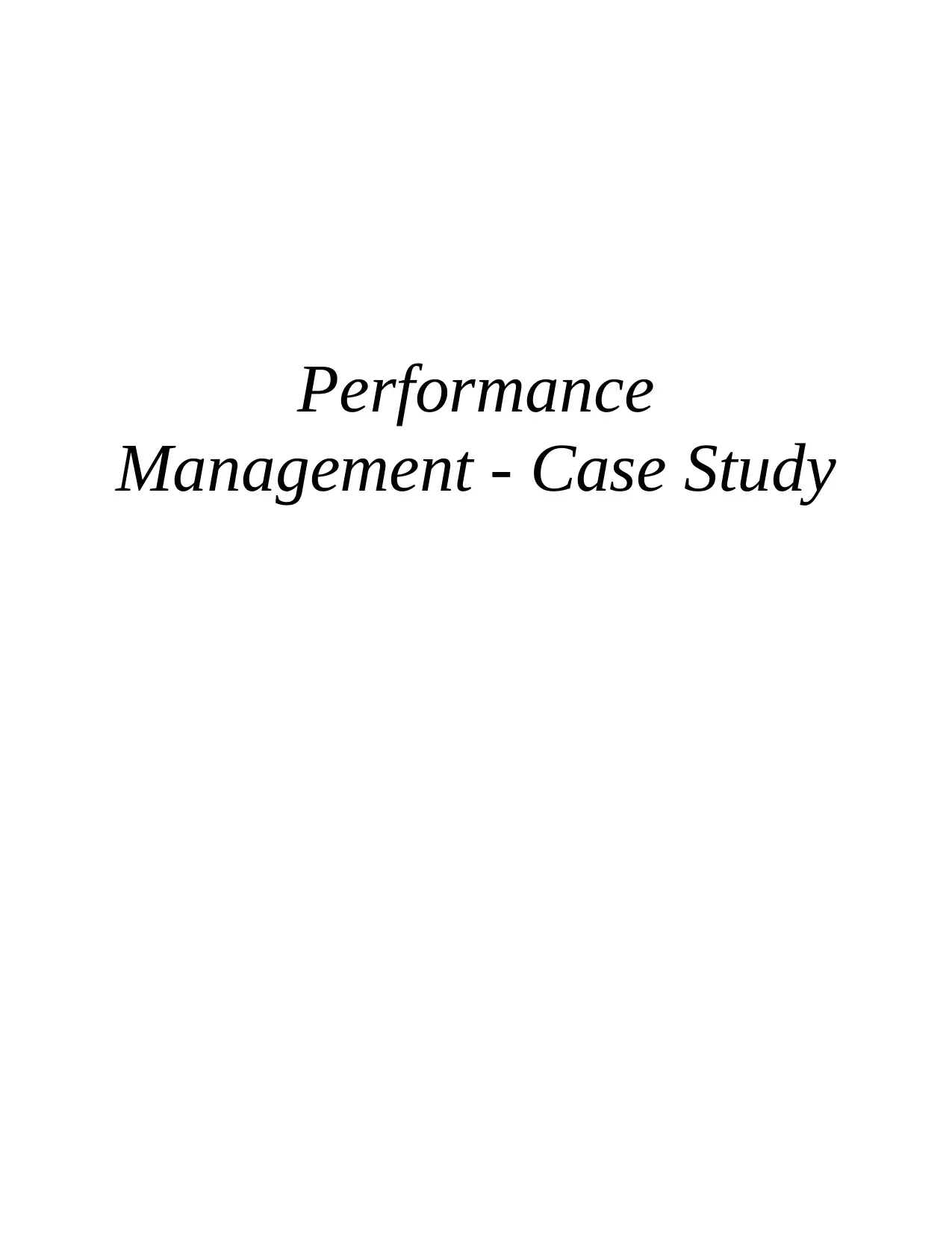
Performance
Management - Case Study
Management - Case Study
Paraphrase This Document
Need a fresh take? Get an instant paraphrase of this document with our AI Paraphraser
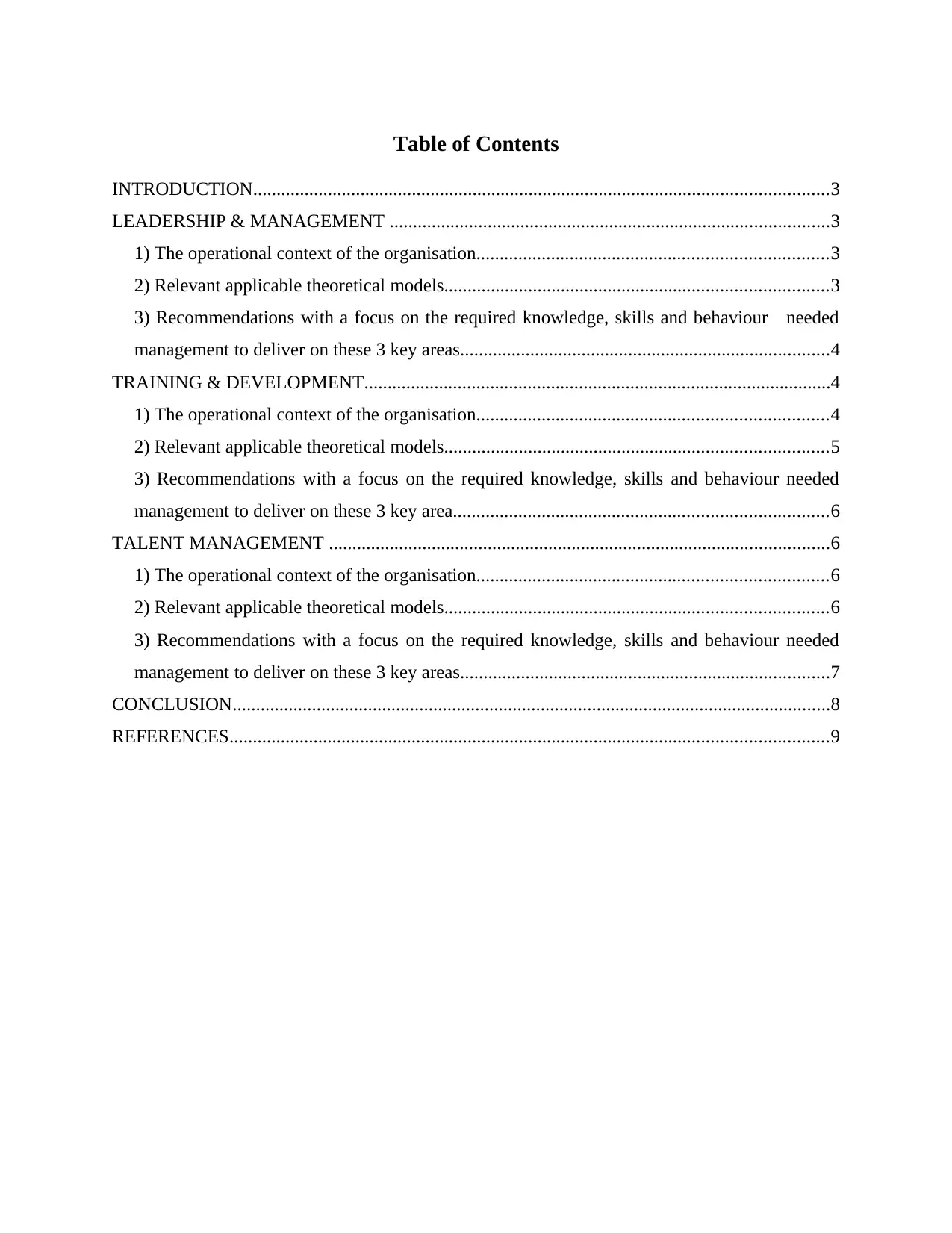
Table of Contents
INTRODUCTION...........................................................................................................................3
LEADERSHIP & MANAGEMENT ..............................................................................................3
1) The operational context of the organisation...........................................................................3
2) Relevant applicable theoretical models..................................................................................3
3) Recommendations with a focus on the required knowledge, skills and behaviour needed
management to deliver on these 3 key areas...............................................................................4
TRAINING & DEVELOPMENT....................................................................................................4
1) The operational context of the organisation...........................................................................4
2) Relevant applicable theoretical models..................................................................................5
3) Recommendations with a focus on the required knowledge, skills and behaviour needed
management to deliver on these 3 key area................................................................................6
TALENT MANAGEMENT ...........................................................................................................6
1) The operational context of the organisation...........................................................................6
2) Relevant applicable theoretical models..................................................................................6
3) Recommendations with a focus on the required knowledge, skills and behaviour needed
management to deliver on these 3 key areas...............................................................................7
CONCLUSION................................................................................................................................8
REFERENCES................................................................................................................................9
INTRODUCTION...........................................................................................................................3
LEADERSHIP & MANAGEMENT ..............................................................................................3
1) The operational context of the organisation...........................................................................3
2) Relevant applicable theoretical models..................................................................................3
3) Recommendations with a focus on the required knowledge, skills and behaviour needed
management to deliver on these 3 key areas...............................................................................4
TRAINING & DEVELOPMENT....................................................................................................4
1) The operational context of the organisation...........................................................................4
2) Relevant applicable theoretical models..................................................................................5
3) Recommendations with a focus on the required knowledge, skills and behaviour needed
management to deliver on these 3 key area................................................................................6
TALENT MANAGEMENT ...........................................................................................................6
1) The operational context of the organisation...........................................................................6
2) Relevant applicable theoretical models..................................................................................6
3) Recommendations with a focus on the required knowledge, skills and behaviour needed
management to deliver on these 3 key areas...............................................................................7
CONCLUSION................................................................................................................................8
REFERENCES................................................................................................................................9
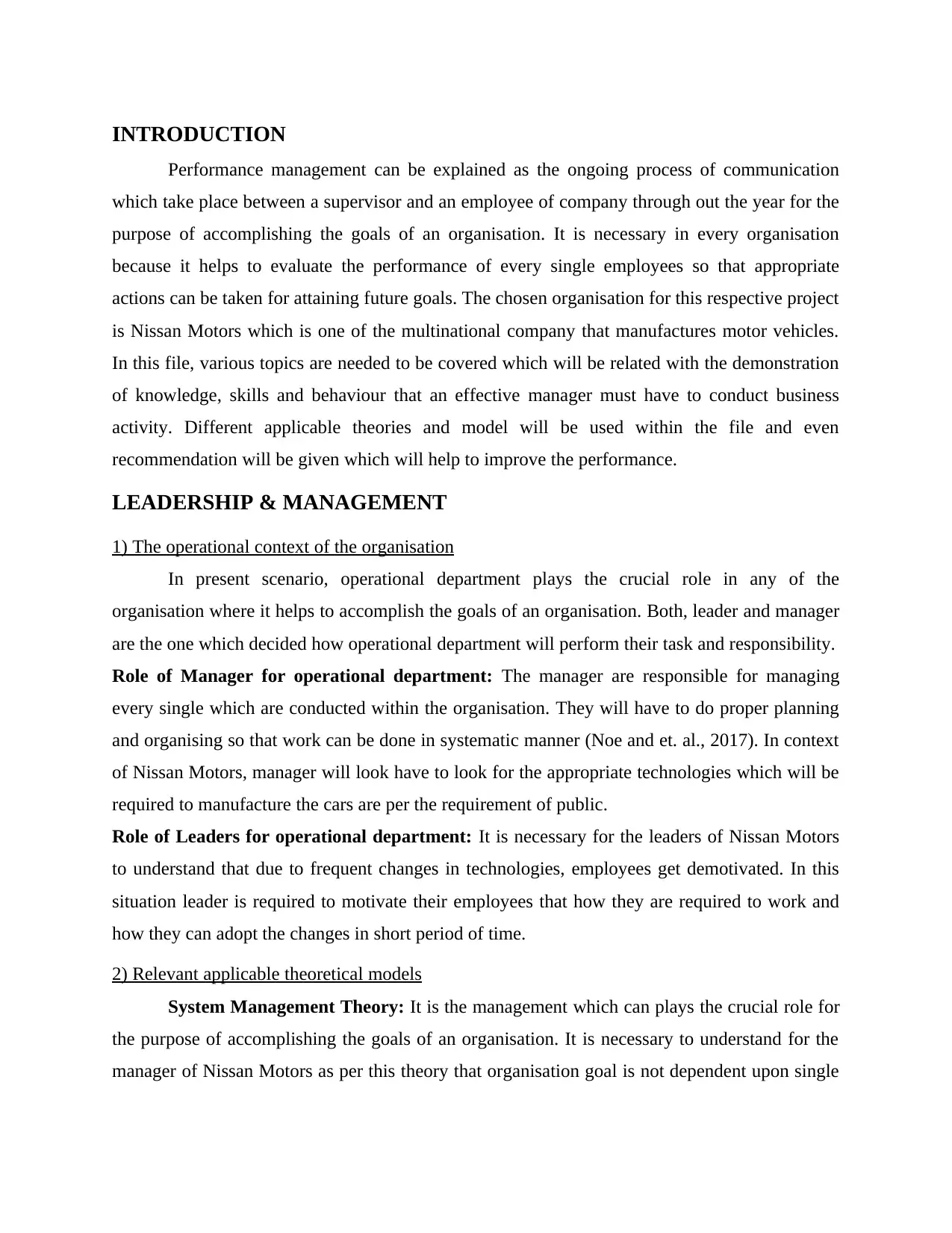
INTRODUCTION
Performance management can be explained as the ongoing process of communication
which take place between a supervisor and an employee of company through out the year for the
purpose of accomplishing the goals of an organisation. It is necessary in every organisation
because it helps to evaluate the performance of every single employees so that appropriate
actions can be taken for attaining future goals. The chosen organisation for this respective project
is Nissan Motors which is one of the multinational company that manufactures motor vehicles.
In this file, various topics are needed to be covered which will be related with the demonstration
of knowledge, skills and behaviour that an effective manager must have to conduct business
activity. Different applicable theories and model will be used within the file and even
recommendation will be given which will help to improve the performance.
LEADERSHIP & MANAGEMENT
1) The operational context of the organisation
In present scenario, operational department plays the crucial role in any of the
organisation where it helps to accomplish the goals of an organisation. Both, leader and manager
are the one which decided how operational department will perform their task and responsibility.
Role of Manager for operational department: The manager are responsible for managing
every single which are conducted within the organisation. They will have to do proper planning
and organising so that work can be done in systematic manner (Noe and et. al., 2017). In context
of Nissan Motors, manager will look have to look for the appropriate technologies which will be
required to manufacture the cars are per the requirement of public.
Role of Leaders for operational department: It is necessary for the leaders of Nissan Motors
to understand that due to frequent changes in technologies, employees get demotivated. In this
situation leader is required to motivate their employees that how they are required to work and
how they can adopt the changes in short period of time.
2) Relevant applicable theoretical models
System Management Theory: It is the management which can plays the crucial role for
the purpose of accomplishing the goals of an organisation. It is necessary to understand for the
manager of Nissan Motors as per this theory that organisation goal is not dependent upon single
Performance management can be explained as the ongoing process of communication
which take place between a supervisor and an employee of company through out the year for the
purpose of accomplishing the goals of an organisation. It is necessary in every organisation
because it helps to evaluate the performance of every single employees so that appropriate
actions can be taken for attaining future goals. The chosen organisation for this respective project
is Nissan Motors which is one of the multinational company that manufactures motor vehicles.
In this file, various topics are needed to be covered which will be related with the demonstration
of knowledge, skills and behaviour that an effective manager must have to conduct business
activity. Different applicable theories and model will be used within the file and even
recommendation will be given which will help to improve the performance.
LEADERSHIP & MANAGEMENT
1) The operational context of the organisation
In present scenario, operational department plays the crucial role in any of the
organisation where it helps to accomplish the goals of an organisation. Both, leader and manager
are the one which decided how operational department will perform their task and responsibility.
Role of Manager for operational department: The manager are responsible for managing
every single which are conducted within the organisation. They will have to do proper planning
and organising so that work can be done in systematic manner (Noe and et. al., 2017). In context
of Nissan Motors, manager will look have to look for the appropriate technologies which will be
required to manufacture the cars are per the requirement of public.
Role of Leaders for operational department: It is necessary for the leaders of Nissan Motors
to understand that due to frequent changes in technologies, employees get demotivated. In this
situation leader is required to motivate their employees that how they are required to work and
how they can adopt the changes in short period of time.
2) Relevant applicable theoretical models
System Management Theory: It is the management which can plays the crucial role for
the purpose of accomplishing the goals of an organisation. It is necessary to understand for the
manager of Nissan Motors as per this theory that organisation goal is not dependent upon single
⊘ This is a preview!⊘
Do you want full access?
Subscribe today to unlock all pages.

Trusted by 1+ million students worldwide
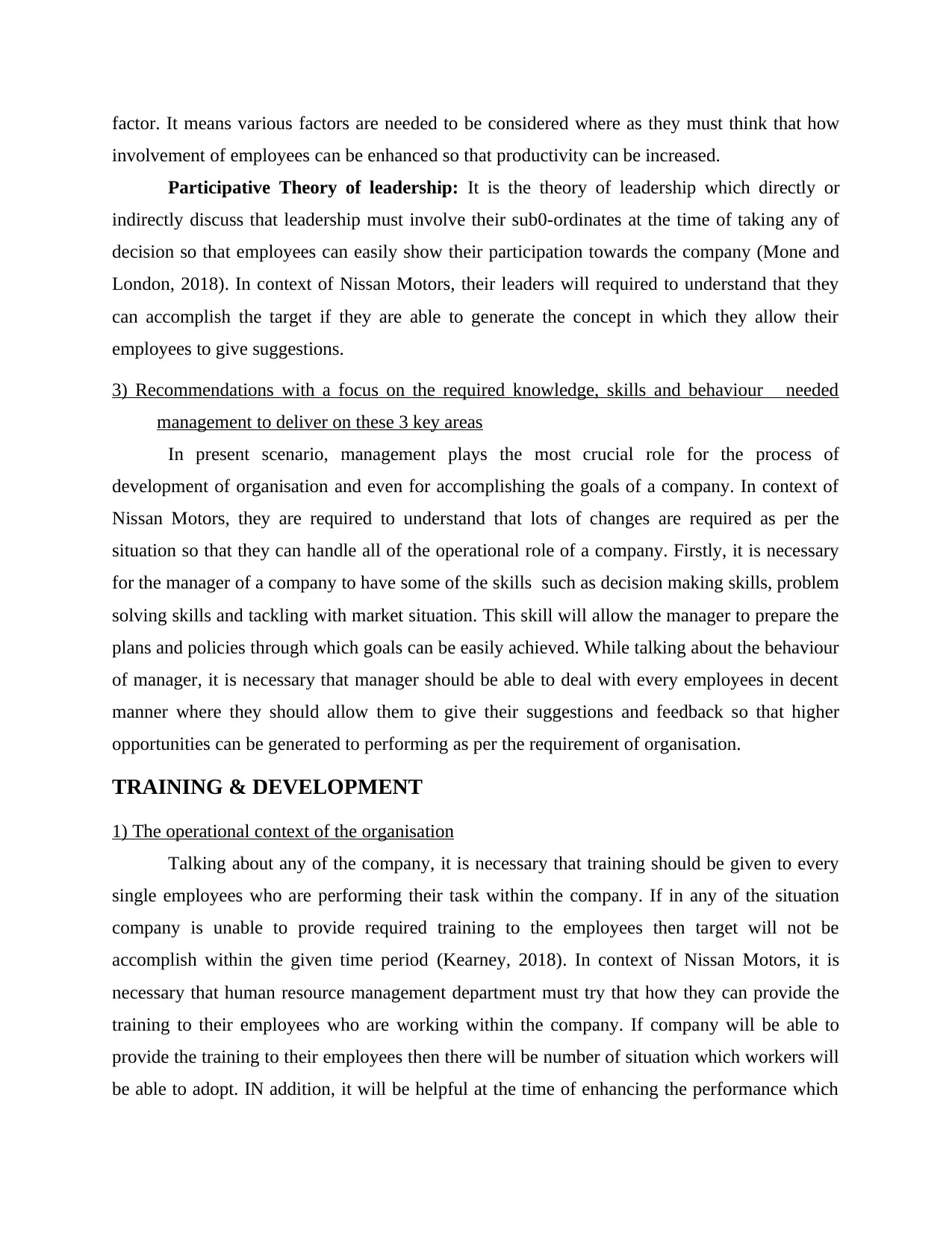
factor. It means various factors are needed to be considered where as they must think that how
involvement of employees can be enhanced so that productivity can be increased.
Participative Theory of leadership: It is the theory of leadership which directly or
indirectly discuss that leadership must involve their sub0-ordinates at the time of taking any of
decision so that employees can easily show their participation towards the company (Mone and
London, 2018). In context of Nissan Motors, their leaders will required to understand that they
can accomplish the target if they are able to generate the concept in which they allow their
employees to give suggestions.
3) Recommendations with a focus on the required knowledge, skills and behaviour needed
management to deliver on these 3 key areas
In present scenario, management plays the most crucial role for the process of
development of organisation and even for accomplishing the goals of a company. In context of
Nissan Motors, they are required to understand that lots of changes are required as per the
situation so that they can handle all of the operational role of a company. Firstly, it is necessary
for the manager of a company to have some of the skills such as decision making skills, problem
solving skills and tackling with market situation. This skill will allow the manager to prepare the
plans and policies through which goals can be easily achieved. While talking about the behaviour
of manager, it is necessary that manager should be able to deal with every employees in decent
manner where they should allow them to give their suggestions and feedback so that higher
opportunities can be generated to performing as per the requirement of organisation.
TRAINING & DEVELOPMENT
1) The operational context of the organisation
Talking about any of the company, it is necessary that training should be given to every
single employees who are performing their task within the company. If in any of the situation
company is unable to provide required training to the employees then target will not be
accomplish within the given time period (Kearney, 2018). In context of Nissan Motors, it is
necessary that human resource management department must try that how they can provide the
training to their employees who are working within the company. If company will be able to
provide the training to their employees then there will be number of situation which workers will
be able to adopt. IN addition, it will be helpful at the time of enhancing the performance which
involvement of employees can be enhanced so that productivity can be increased.
Participative Theory of leadership: It is the theory of leadership which directly or
indirectly discuss that leadership must involve their sub0-ordinates at the time of taking any of
decision so that employees can easily show their participation towards the company (Mone and
London, 2018). In context of Nissan Motors, their leaders will required to understand that they
can accomplish the target if they are able to generate the concept in which they allow their
employees to give suggestions.
3) Recommendations with a focus on the required knowledge, skills and behaviour needed
management to deliver on these 3 key areas
In present scenario, management plays the most crucial role for the process of
development of organisation and even for accomplishing the goals of a company. In context of
Nissan Motors, they are required to understand that lots of changes are required as per the
situation so that they can handle all of the operational role of a company. Firstly, it is necessary
for the manager of a company to have some of the skills such as decision making skills, problem
solving skills and tackling with market situation. This skill will allow the manager to prepare the
plans and policies through which goals can be easily achieved. While talking about the behaviour
of manager, it is necessary that manager should be able to deal with every employees in decent
manner where they should allow them to give their suggestions and feedback so that higher
opportunities can be generated to performing as per the requirement of organisation.
TRAINING & DEVELOPMENT
1) The operational context of the organisation
Talking about any of the company, it is necessary that training should be given to every
single employees who are performing their task within the company. If in any of the situation
company is unable to provide required training to the employees then target will not be
accomplish within the given time period (Kearney, 2018). In context of Nissan Motors, it is
necessary that human resource management department must try that how they can provide the
training to their employees who are working within the company. If company will be able to
provide the training to their employees then there will be number of situation which workers will
be able to adopt. IN addition, it will be helpful at the time of enhancing the performance which
Paraphrase This Document
Need a fresh take? Get an instant paraphrase of this document with our AI Paraphraser
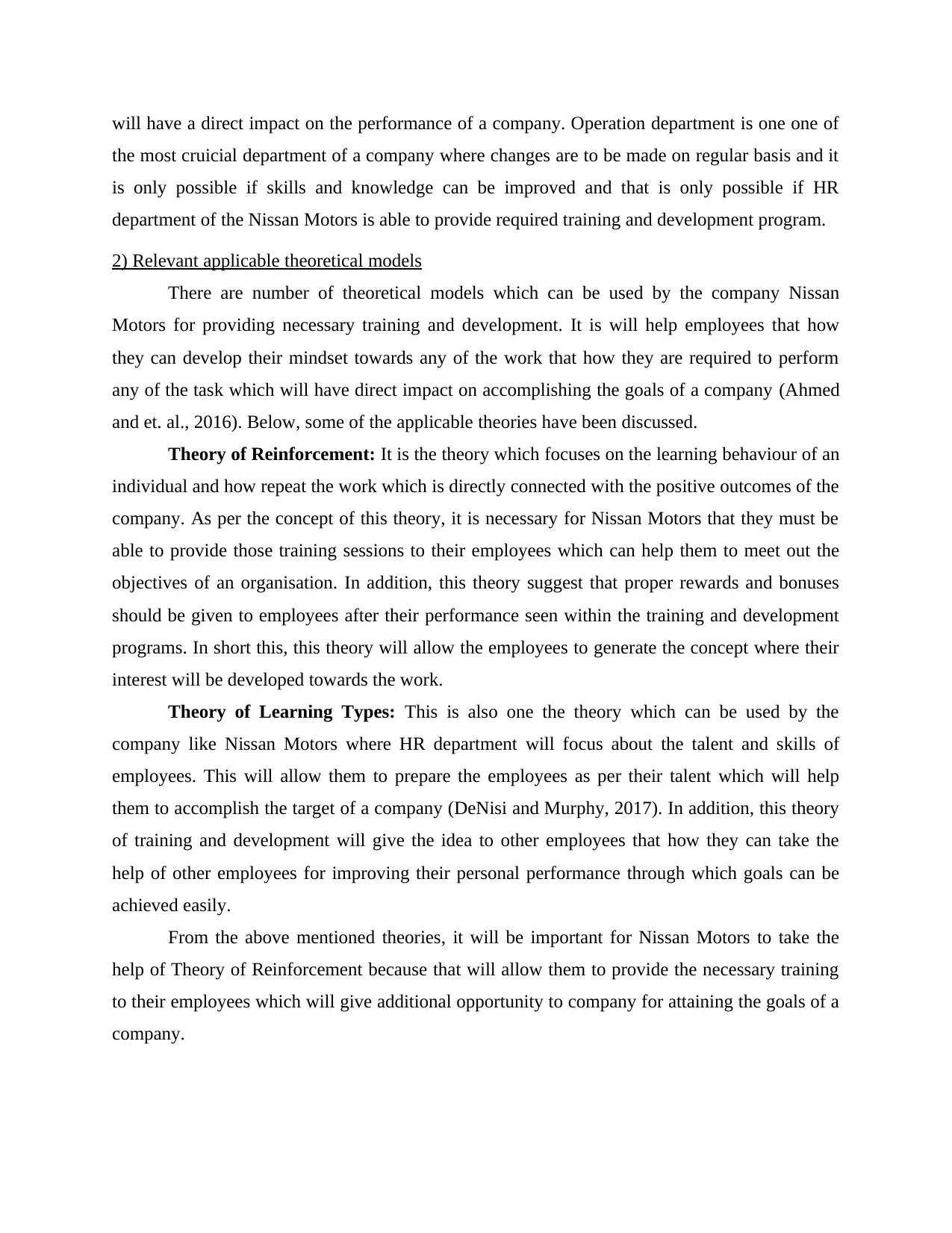
will have a direct impact on the performance of a company. Operation department is one one of
the most cruicial department of a company where changes are to be made on regular basis and it
is only possible if skills and knowledge can be improved and that is only possible if HR
department of the Nissan Motors is able to provide required training and development program.
2) Relevant applicable theoretical models
There are number of theoretical models which can be used by the company Nissan
Motors for providing necessary training and development. It is will help employees that how
they can develop their mindset towards any of the work that how they are required to perform
any of the task which will have direct impact on accomplishing the goals of a company (Ahmed
and et. al., 2016). Below, some of the applicable theories have been discussed.
Theory of Reinforcement: It is the theory which focuses on the learning behaviour of an
individual and how repeat the work which is directly connected with the positive outcomes of the
company. As per the concept of this theory, it is necessary for Nissan Motors that they must be
able to provide those training sessions to their employees which can help them to meet out the
objectives of an organisation. In addition, this theory suggest that proper rewards and bonuses
should be given to employees after their performance seen within the training and development
programs. In short this, this theory will allow the employees to generate the concept where their
interest will be developed towards the work.
Theory of Learning Types: This is also one the theory which can be used by the
company like Nissan Motors where HR department will focus about the talent and skills of
employees. This will allow them to prepare the employees as per their talent which will help
them to accomplish the target of a company (DeNisi and Murphy, 2017). In addition, this theory
of training and development will give the idea to other employees that how they can take the
help of other employees for improving their personal performance through which goals can be
achieved easily.
From the above mentioned theories, it will be important for Nissan Motors to take the
help of Theory of Reinforcement because that will allow them to provide the necessary training
to their employees which will give additional opportunity to company for attaining the goals of a
company.
the most cruicial department of a company where changes are to be made on regular basis and it
is only possible if skills and knowledge can be improved and that is only possible if HR
department of the Nissan Motors is able to provide required training and development program.
2) Relevant applicable theoretical models
There are number of theoretical models which can be used by the company Nissan
Motors for providing necessary training and development. It is will help employees that how
they can develop their mindset towards any of the work that how they are required to perform
any of the task which will have direct impact on accomplishing the goals of a company (Ahmed
and et. al., 2016). Below, some of the applicable theories have been discussed.
Theory of Reinforcement: It is the theory which focuses on the learning behaviour of an
individual and how repeat the work which is directly connected with the positive outcomes of the
company. As per the concept of this theory, it is necessary for Nissan Motors that they must be
able to provide those training sessions to their employees which can help them to meet out the
objectives of an organisation. In addition, this theory suggest that proper rewards and bonuses
should be given to employees after their performance seen within the training and development
programs. In short this, this theory will allow the employees to generate the concept where their
interest will be developed towards the work.
Theory of Learning Types: This is also one the theory which can be used by the
company like Nissan Motors where HR department will focus about the talent and skills of
employees. This will allow them to prepare the employees as per their talent which will help
them to accomplish the target of a company (DeNisi and Murphy, 2017). In addition, this theory
of training and development will give the idea to other employees that how they can take the
help of other employees for improving their personal performance through which goals can be
achieved easily.
From the above mentioned theories, it will be important for Nissan Motors to take the
help of Theory of Reinforcement because that will allow them to provide the necessary training
to their employees which will give additional opportunity to company for attaining the goals of a
company.
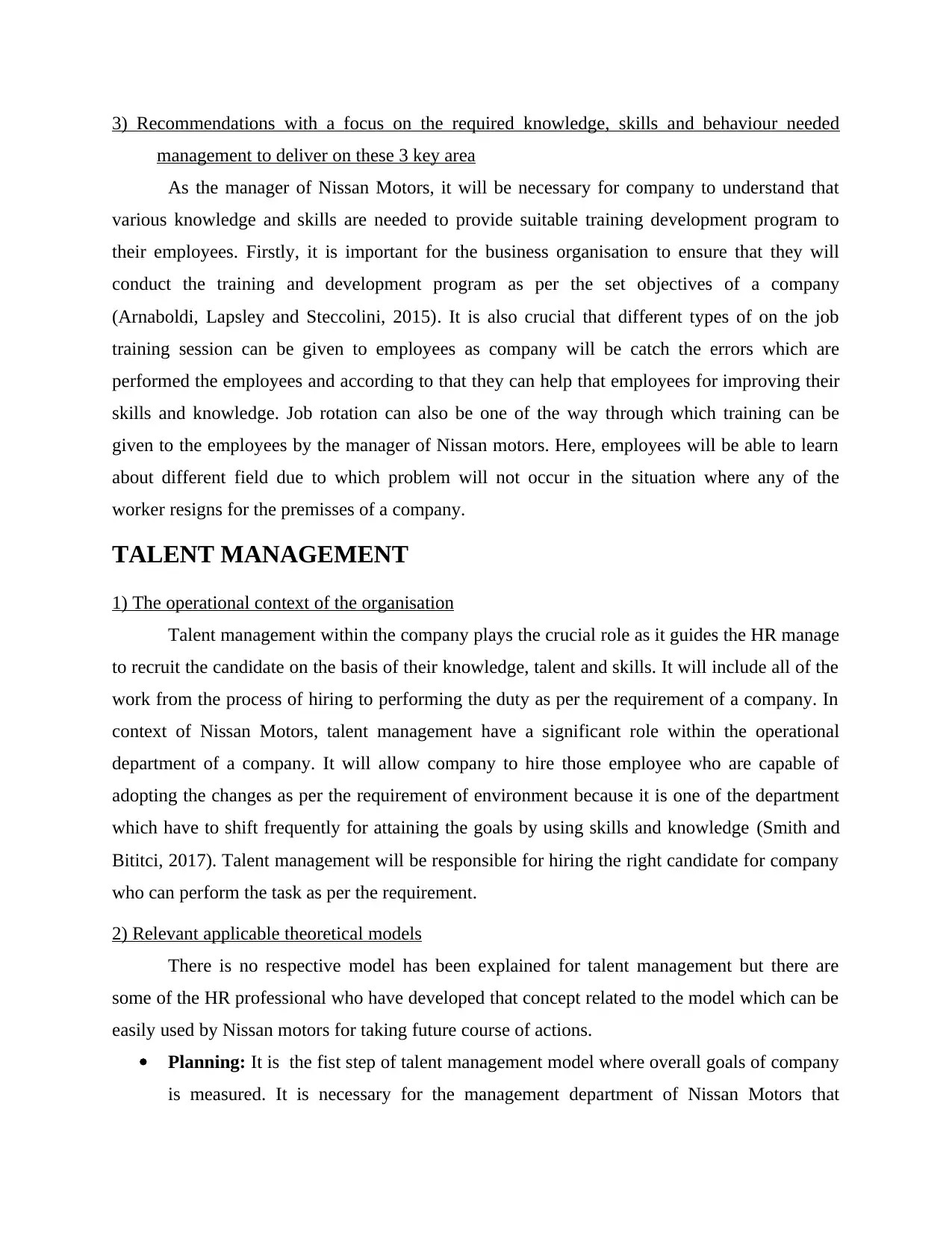
3) Recommendations with a focus on the required knowledge, skills and behaviour needed
management to deliver on these 3 key area
As the manager of Nissan Motors, it will be necessary for company to understand that
various knowledge and skills are needed to provide suitable training development program to
their employees. Firstly, it is important for the business organisation to ensure that they will
conduct the training and development program as per the set objectives of a company
(Arnaboldi, Lapsley and Steccolini, 2015). It is also crucial that different types of on the job
training session can be given to employees as company will be catch the errors which are
performed the employees and according to that they can help that employees for improving their
skills and knowledge. Job rotation can also be one of the way through which training can be
given to the employees by the manager of Nissan motors. Here, employees will be able to learn
about different field due to which problem will not occur in the situation where any of the
worker resigns for the premisses of a company.
TALENT MANAGEMENT
1) The operational context of the organisation
Talent management within the company plays the crucial role as it guides the HR manage
to recruit the candidate on the basis of their knowledge, talent and skills. It will include all of the
work from the process of hiring to performing the duty as per the requirement of a company. In
context of Nissan Motors, talent management have a significant role within the operational
department of a company. It will allow company to hire those employee who are capable of
adopting the changes as per the requirement of environment because it is one of the department
which have to shift frequently for attaining the goals by using skills and knowledge (Smith and
Bititci, 2017). Talent management will be responsible for hiring the right candidate for company
who can perform the task as per the requirement.
2) Relevant applicable theoretical models
There is no respective model has been explained for talent management but there are
some of the HR professional who have developed that concept related to the model which can be
easily used by Nissan motors for taking future course of actions.
Planning: It is the fist step of talent management model where overall goals of company
is measured. It is necessary for the management department of Nissan Motors that
management to deliver on these 3 key area
As the manager of Nissan Motors, it will be necessary for company to understand that
various knowledge and skills are needed to provide suitable training development program to
their employees. Firstly, it is important for the business organisation to ensure that they will
conduct the training and development program as per the set objectives of a company
(Arnaboldi, Lapsley and Steccolini, 2015). It is also crucial that different types of on the job
training session can be given to employees as company will be catch the errors which are
performed the employees and according to that they can help that employees for improving their
skills and knowledge. Job rotation can also be one of the way through which training can be
given to the employees by the manager of Nissan motors. Here, employees will be able to learn
about different field due to which problem will not occur in the situation where any of the
worker resigns for the premisses of a company.
TALENT MANAGEMENT
1) The operational context of the organisation
Talent management within the company plays the crucial role as it guides the HR manage
to recruit the candidate on the basis of their knowledge, talent and skills. It will include all of the
work from the process of hiring to performing the duty as per the requirement of a company. In
context of Nissan Motors, talent management have a significant role within the operational
department of a company. It will allow company to hire those employee who are capable of
adopting the changes as per the requirement of environment because it is one of the department
which have to shift frequently for attaining the goals by using skills and knowledge (Smith and
Bititci, 2017). Talent management will be responsible for hiring the right candidate for company
who can perform the task as per the requirement.
2) Relevant applicable theoretical models
There is no respective model has been explained for talent management but there are
some of the HR professional who have developed that concept related to the model which can be
easily used by Nissan motors for taking future course of actions.
Planning: It is the fist step of talent management model where overall goals of company
is measured. It is necessary for the management department of Nissan Motors that
⊘ This is a preview!⊘
Do you want full access?
Subscribe today to unlock all pages.

Trusted by 1+ million students worldwide
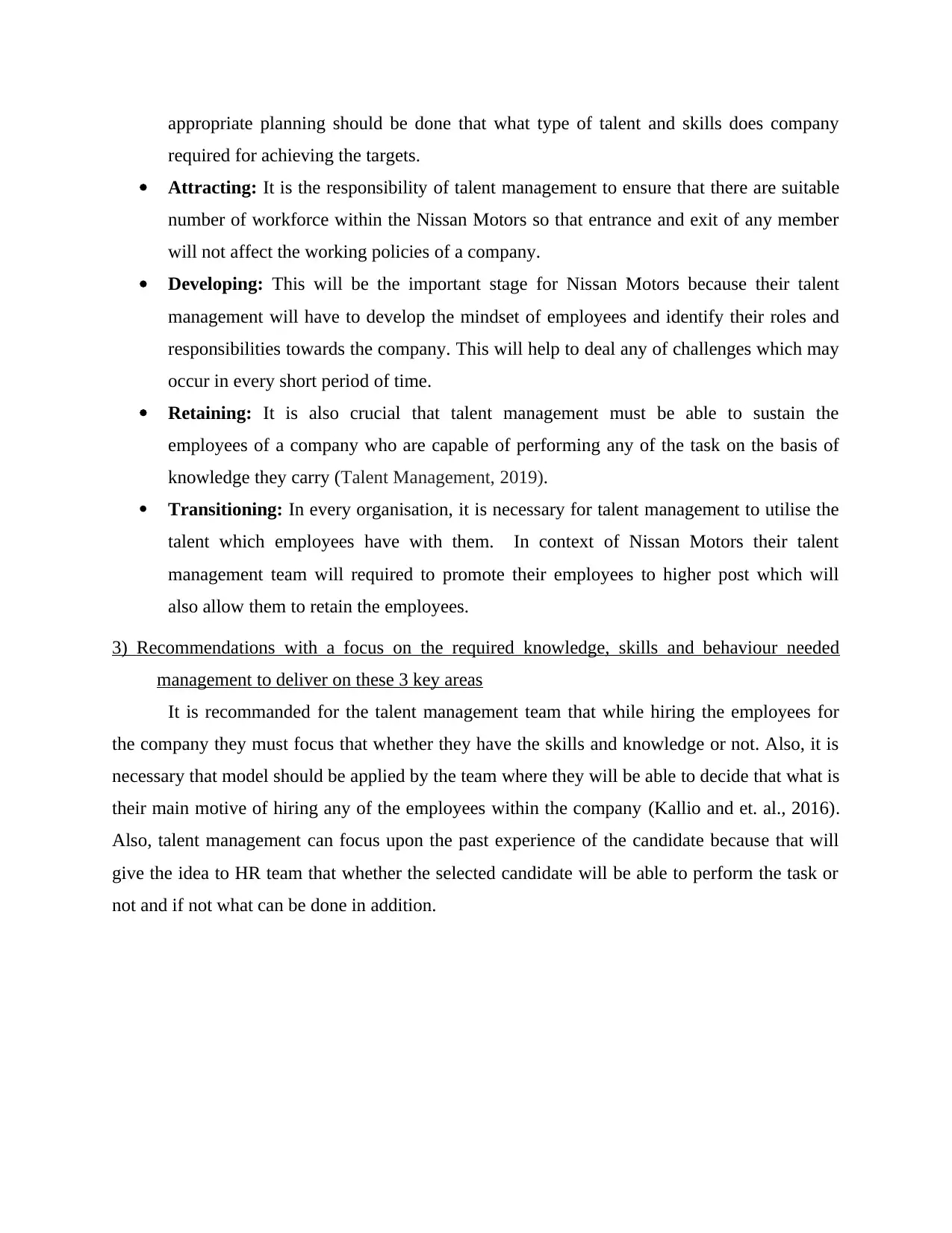
appropriate planning should be done that what type of talent and skills does company
required for achieving the targets.
Attracting: It is the responsibility of talent management to ensure that there are suitable
number of workforce within the Nissan Motors so that entrance and exit of any member
will not affect the working policies of a company.
Developing: This will be the important stage for Nissan Motors because their talent
management will have to develop the mindset of employees and identify their roles and
responsibilities towards the company. This will help to deal any of challenges which may
occur in every short period of time.
Retaining: It is also crucial that talent management must be able to sustain the
employees of a company who are capable of performing any of the task on the basis of
knowledge they carry (Talent Management, 2019).
Transitioning: In every organisation, it is necessary for talent management to utilise the
talent which employees have with them. In context of Nissan Motors their talent
management team will required to promote their employees to higher post which will
also allow them to retain the employees.
3) Recommendations with a focus on the required knowledge, skills and behaviour needed
management to deliver on these 3 key areas
It is recommanded for the talent management team that while hiring the employees for
the company they must focus that whether they have the skills and knowledge or not. Also, it is
necessary that model should be applied by the team where they will be able to decide that what is
their main motive of hiring any of the employees within the company (Kallio and et. al., 2016).
Also, talent management can focus upon the past experience of the candidate because that will
give the idea to HR team that whether the selected candidate will be able to perform the task or
not and if not what can be done in addition.
required for achieving the targets.
Attracting: It is the responsibility of talent management to ensure that there are suitable
number of workforce within the Nissan Motors so that entrance and exit of any member
will not affect the working policies of a company.
Developing: This will be the important stage for Nissan Motors because their talent
management will have to develop the mindset of employees and identify their roles and
responsibilities towards the company. This will help to deal any of challenges which may
occur in every short period of time.
Retaining: It is also crucial that talent management must be able to sustain the
employees of a company who are capable of performing any of the task on the basis of
knowledge they carry (Talent Management, 2019).
Transitioning: In every organisation, it is necessary for talent management to utilise the
talent which employees have with them. In context of Nissan Motors their talent
management team will required to promote their employees to higher post which will
also allow them to retain the employees.
3) Recommendations with a focus on the required knowledge, skills and behaviour needed
management to deliver on these 3 key areas
It is recommanded for the talent management team that while hiring the employees for
the company they must focus that whether they have the skills and knowledge or not. Also, it is
necessary that model should be applied by the team where they will be able to decide that what is
their main motive of hiring any of the employees within the company (Kallio and et. al., 2016).
Also, talent management can focus upon the past experience of the candidate because that will
give the idea to HR team that whether the selected candidate will be able to perform the task or
not and if not what can be done in addition.
Paraphrase This Document
Need a fresh take? Get an instant paraphrase of this document with our AI Paraphraser
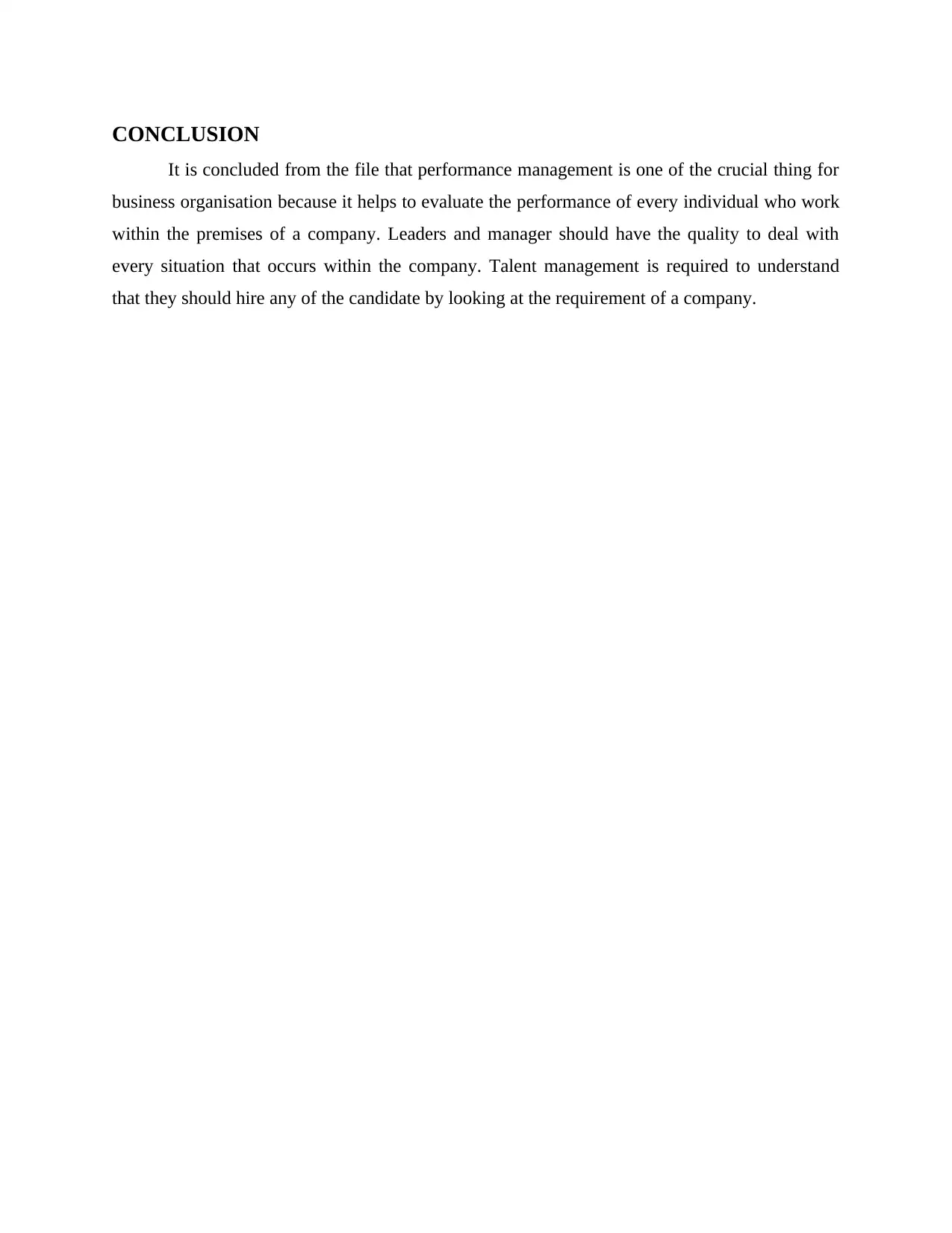
CONCLUSION
It is concluded from the file that performance management is one of the crucial thing for
business organisation because it helps to evaluate the performance of every individual who work
within the premises of a company. Leaders and manager should have the quality to deal with
every situation that occurs within the company. Talent management is required to understand
that they should hire any of the candidate by looking at the requirement of a company.
It is concluded from the file that performance management is one of the crucial thing for
business organisation because it helps to evaluate the performance of every individual who work
within the premises of a company. Leaders and manager should have the quality to deal with
every situation that occurs within the company. Talent management is required to understand
that they should hire any of the candidate by looking at the requirement of a company.
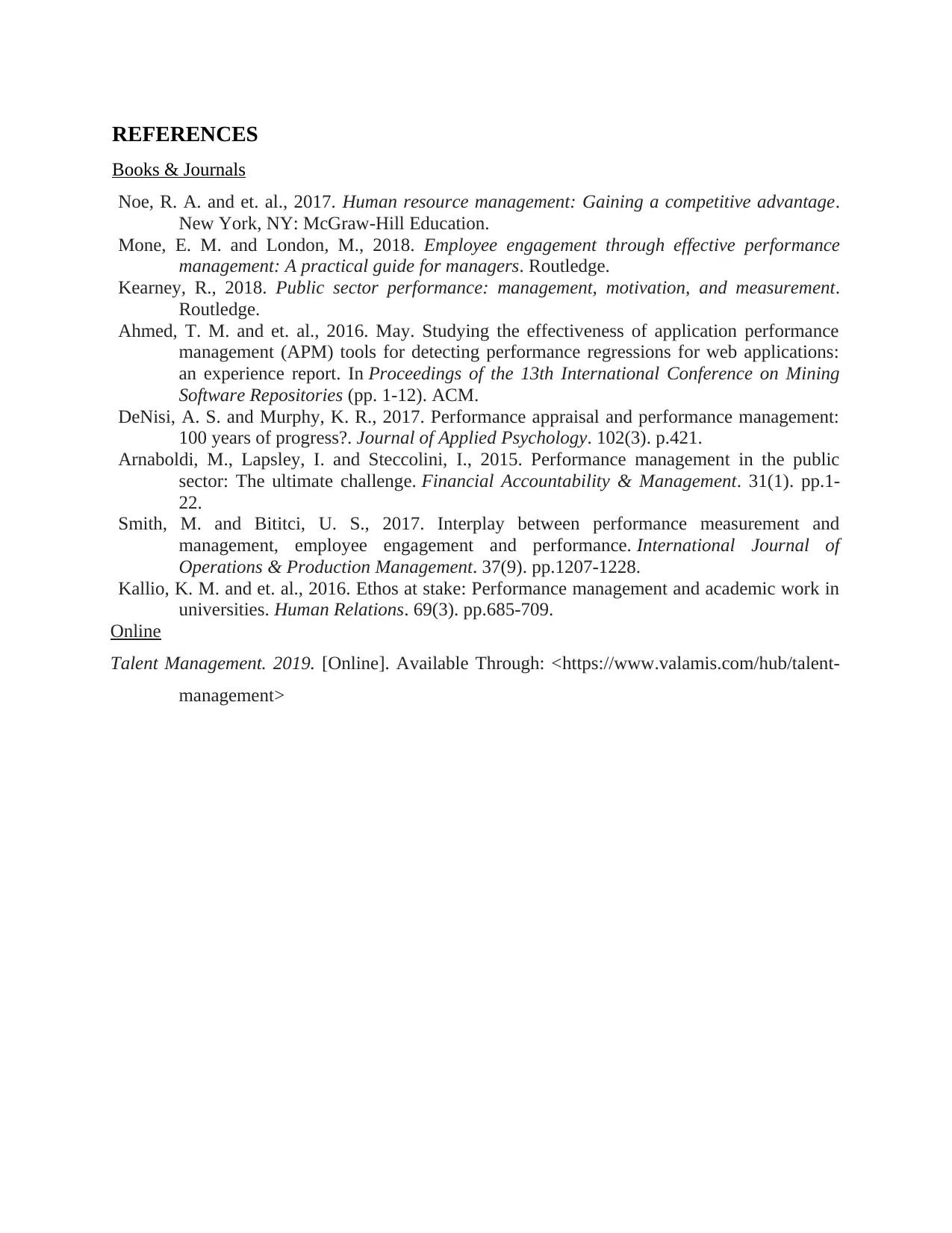
REFERENCES
Books & Journals
Noe, R. A. and et. al., 2017. Human resource management: Gaining a competitive advantage.
New York, NY: McGraw-Hill Education.
Mone, E. M. and London, M., 2018. Employee engagement through effective performance
management: A practical guide for managers. Routledge.
Kearney, R., 2018. Public sector performance: management, motivation, and measurement.
Routledge.
Ahmed, T. M. and et. al., 2016. May. Studying the effectiveness of application performance
management (APM) tools for detecting performance regressions for web applications:
an experience report. In Proceedings of the 13th International Conference on Mining
Software Repositories (pp. 1-12). ACM.
DeNisi, A. S. and Murphy, K. R., 2017. Performance appraisal and performance management:
100 years of progress?. Journal of Applied Psychology. 102(3). p.421.
Arnaboldi, M., Lapsley, I. and Steccolini, I., 2015. Performance management in the public
sector: The ultimate challenge. Financial Accountability & Management. 31(1). pp.1-
22.
Smith, M. and Bititci, U. S., 2017. Interplay between performance measurement and
management, employee engagement and performance. International Journal of
Operations & Production Management. 37(9). pp.1207-1228.
Kallio, K. M. and et. al., 2016. Ethos at stake: Performance management and academic work in
universities. Human Relations. 69(3). pp.685-709.
Online
Talent Management. 2019. [Online]. Available Through: <https://www.valamis.com/hub/talent-
management>
Books & Journals
Noe, R. A. and et. al., 2017. Human resource management: Gaining a competitive advantage.
New York, NY: McGraw-Hill Education.
Mone, E. M. and London, M., 2018. Employee engagement through effective performance
management: A practical guide for managers. Routledge.
Kearney, R., 2018. Public sector performance: management, motivation, and measurement.
Routledge.
Ahmed, T. M. and et. al., 2016. May. Studying the effectiveness of application performance
management (APM) tools for detecting performance regressions for web applications:
an experience report. In Proceedings of the 13th International Conference on Mining
Software Repositories (pp. 1-12). ACM.
DeNisi, A. S. and Murphy, K. R., 2017. Performance appraisal and performance management:
100 years of progress?. Journal of Applied Psychology. 102(3). p.421.
Arnaboldi, M., Lapsley, I. and Steccolini, I., 2015. Performance management in the public
sector: The ultimate challenge. Financial Accountability & Management. 31(1). pp.1-
22.
Smith, M. and Bititci, U. S., 2017. Interplay between performance measurement and
management, employee engagement and performance. International Journal of
Operations & Production Management. 37(9). pp.1207-1228.
Kallio, K. M. and et. al., 2016. Ethos at stake: Performance management and academic work in
universities. Human Relations. 69(3). pp.685-709.
Online
Talent Management. 2019. [Online]. Available Through: <https://www.valamis.com/hub/talent-
management>
⊘ This is a preview!⊘
Do you want full access?
Subscribe today to unlock all pages.

Trusted by 1+ million students worldwide
1 out of 9
Related Documents
Your All-in-One AI-Powered Toolkit for Academic Success.
+13062052269
info@desklib.com
Available 24*7 on WhatsApp / Email
![[object Object]](/_next/static/media/star-bottom.7253800d.svg)
Unlock your academic potential
Copyright © 2020–2026 A2Z Services. All Rights Reserved. Developed and managed by ZUCOL.




